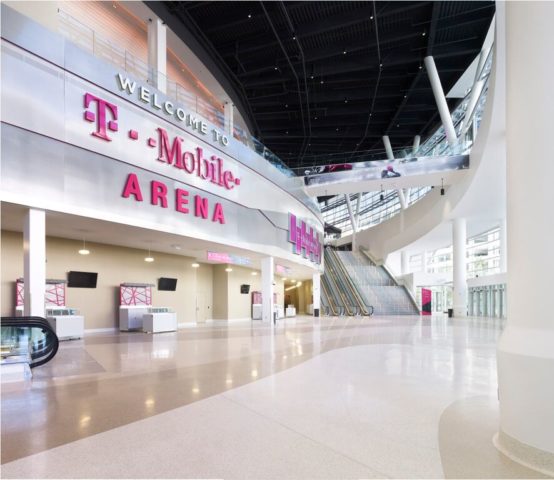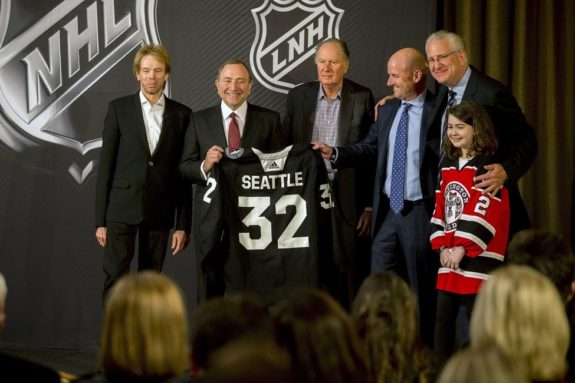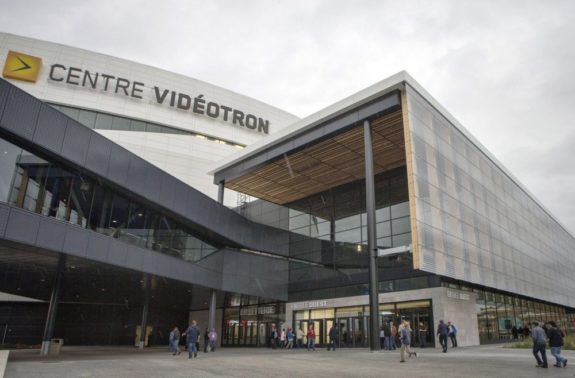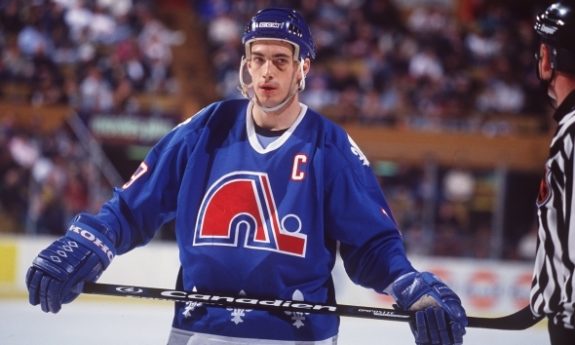On June 22, 2016, the city of Las Vegas was awarded an NHL franchise by the League’s Board of Governors at their summer meetings. Billionaire Bill Foley paid $500 million to the NHL’s other owners as an expansion fee for the rights to ice the league’s 31st franchise. Vegas was the NHL’s first expansion team since 2000 when Minnesota and Columbus each paid $80 million to join the league.
At the same press conference, NHL Commissioner Gary Bettman announced that an expansion bid from Quebec City was “deferred.” The board expressed concerns about the city’s small market, the volatility of the Canadian currency, and the fact that a geographical imbalance already existed with 14 teams in the Western Conference and 16 in the Eastern Conference.

Fast forward to Dec. 4, 2018, to the League’s Board of Governors winter meetings when the city of Seattle was awarded the NHL’s 32nd franchise. The Seattle ownership group will pay 30 percent more than Vegas with the expansion fee set at $650 million, on top of the estimated $800 million to renovate the KeyArena and $70 million for a new practice facility.

While the awarding of the Seattle franchise took center stage at the meetings, the governors also discussed the salary cap for the 2019-20 season and the possibility of a 2020 World Cup of Hockey. Conspicuous by its absence was any discussion about a return of NHL hockey to Quebec City.
Let’s go back to 2016 and review the reasons why Quebec City was likely overlooked as an expansion franchise at that time and what barriers continue to exist for their hopes of the NHL returning to their city.
Expansion Versus Relocation
The league appears to be more interested in expansion rather than relocation, as evidenced by the recent awarding of franchises to both Las Vegas and Seattle. A significant issue for any Canadian team bid is that the expansion fee has increased to $650 million which is payable in US dollars. That would convert to $877 million Canadian today based on current exchange rates.
By not awarding two franchises at the same time in 2016, the league was in a position to increase the fee for the Seattle bid by $150 million two and one-half years ago later. Mr. Bettman is very good at finding ways to improve team owner bank accounts.
If the Canadian dollar weakness persists, the franchise fee will continue to be a significant barrier to any Canadian market looking to ice an NHL team. Relocation of a struggling US franchise would be much more affordable for a Canadian city and not dilute player talent. However, Mr. Bettman is very reluctant to admit when he has made an expansion or relocation mistake, especially in a US market.
The Montreal Factor
Since the relocation of the Quebec Nordiques to Colorado, the Montreal Canadians have emerged with monopoly power in the province of Quebec, which has significantly increased the value of the franchise and the revenues they generate. The Canadiens’ monopoly in that market has helped the organization become one of the most profitable in the league, and as such, an essential contributor to the revenue-sharing plan that supports the least profitable NHL franchises. According to the 2018 Forbes Magazine NHL Valuation issue, the Canadiens recorded $239 million in revenues during the 2017-18 season, second only to the New York Rangers at $253 million.
Quebec City is not a new market for the league which is what the league is looking for to grow the game. According to MacPherson of the Montreal Gazette, “Its residents are already fans of the NHL. When their former NHL team, the Nordiques, left in 1995, they became part of the natural Quebec market, in particular, the television audience of the Montreal Canadiens.” (from ‘Why the NHL [and the Montreal Canadiens] said no to Quebec City’, The Montreal Gazette – 6/23/16). The NHL Board of Governors, including Canadiens President and CEO, Geoff Molson, voted unanimously to defer the Quebec City bid to protect the monopoly power of the Canadiens.
Quebec City Market
Given that Quebec City would be considered a small market in the league, the franchise would likely be challenged to make a profit. The city has a population of approximately 531,902 in 2017, while the surrounding area (the administrative division of Quebec) is home to 800,296 people. The population size makes it Canada’s seventh largest metropolitan area, slightly larger than Winnipeg.
Quebec City has a small corporate sector to support critical advertising and sponsorship needs, and the rental of luxury boxes in the new arena. According to Sportsnet.ca, “…the (Quebec City) application (in 2016) did not properly address how and where the (corporate) dollars would come from. It was the weak link in the proposal.”
While hockey fans and politicians in Quebec City collectively showed their support for a return of NHL hockey, the cost of building a new arena was put on the backs of taxpayers. Quebec City’s Centre Vidéotron, now managed by Quebecor, was paid for entirely by the municipal and provincial governments at the cost of $370 million in 2015. The arena seats 18,259 fans for hockey which might be considered too much capacity for a small marketplace.

When Winnipeg was looking to get their NHL franchise back, they appear to have followed a strategy that was attractive to the NHL Board of Governors. The MTS Center opened in 2004 and built with the hopes of bringing the Jets back to Winnipeg. The building holds 15,004, which is the right size considering that Winnipeg is a small market team.
Jets President Mark Chipman talked about building the MTS Center and suggested that a “…building has to fit the market” (from ‘Bettman touts Jets as the new gold standard for small-market franchises’, The Globe and Mail – 4/20/15). Chipman was smart enough to recognize that it would be hard to fill a building that holds 19,000 people. He knew that having a smaller arena created a higher demand for tickets, and can still generate revenues comparable to larger facilities.
Currency Risk and Intangibles
The Canadian dollar was trading at $0.7802 U.S. the same day the new Las Vegas franchise was announced. The financial constraints this would have put on Quebec City’s ability to pay a $500 million US franchise fee, as well as pay player salaries and most travel costs in U.S. dollars, was too risky for the league to accept.
According to Sportsnet.ca, at the Las Vegas press conference, “NHL commissioner Gary Bettman suggested that the fluctuating Canadian dollar (had) cost the league up to $200 million in revenue.” (from ‘Why the NHL [and the Montreal Canadiens] said no to Quebec City’, The Montreal Gazette – 6/23/16). Today the Canadian dollar trades at $0.7463 U.S., 4.3 percent lower than when Vegas celebrated its successful franchise bid.
It is safe to assume that the league continues to be concerned about the financial risk of awarding Quebec City a team, especially an expansion franchise. If the team loses money, the strain on league revenue sharing monies will increase. This increased cost would dilute each team’s expansion fee that they would receive for approving a new expansion team. Ultimately, the Montreal Canadians would be required to be a significant contributor to the revenue sharing dollars allocated to Quebec City.
League Conference Alignment
When Quebec City filed its bid for an expansion franchise, the NHL had an unbalanced number of teams in each conference. Following the awarding of a franchise to Las Vegas, it was likely that the next expansion team would be a western city to balance out the two conferences.
Having just reorganized the conferences by moving Detroit and Columbus to the east and Winnipeg to the west, the NHL was looking for another western based franchise. The successful Seattle bid announced this week accomplishes balance in the league for both the conferences and divisions. Seattle will likely move to the Pacific Division, which of course already has eight teams, so there will be more realignment needed. The Arizona Coyotes will move to the Central Division, resulting in eight teams in all four divisions.
So where does this leave Quebec City in its efforts to have an NHL franchise once again? The strategy of “Build it and they will come” has not worked to date, with the government-funded Centre Videotron underutilized and running operating deficits every year since 2015.
There has been no indication from the NHL League office that Quebec City will eventually be granted a franchise. It appears that Quebec’s best chance to get a team will be from the relocation of an already eastern-based franchise. According to Forbes Magazine, during the 2017-18 season, four eastern teams lost money last year. They include the New York Islanders, Carolina Hurricanes, Columbus Blue Jackets, and the Florida Panthers, who lost a league-leading $21.3 million. The Panthers would be a clear front-runner for relocation.
On a personal note, I worked with the Nordiques during the 1983-84 and 1984-85 seasons as the coach and general manager of their AHL farm team in Fredericton, New Brunswick. During my first NHL training camp in Quebec City, I was invited by head coach Michel Bergeron to join him behind the bench for an exhibition game between the Montreal Canadiens and the Nordiques. I experienced a level of intensity that I had never seen before in a hockey game and a rivalry that was unequaled.

This rivalry is an intangible that the NHL needs to consider, as Quebec City fans are passionate about the game but are forced to support a team three hours down the road. Unfortunately, Nordiques fans will continue to wait and hope, as long as the numbers don’t add up.